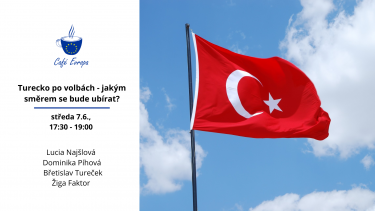INVITATION | EU±// Election season in Central Europe - what lies ahead for our region?
We would like to invite you to the next debate in the EU± series, this time on the topic "Election season in Central Europe - what lies ahead for our region?". The debate will take place online on 19 June at 18:00.
Show moreRadiožurnál: Hungary without the Presidency? A slap in the face for Orbán and a sign of EU frustration with his policies, says expert
In the Bruselské chlebíčky podcast, the head of the Brussels office of the EUROPEUM think-tank comments on the situation with the upcoming European Presidency. The incoming Spanish presidency is currently open-ended, due to the upcoming Spanish elections, and the Hungarian presidency next year is one that MEPs would prefer to abolish altogether.
Show more
INVITATION | Café Evropa online: Turkey after the elections - what direction will Turkey take?
We cordially invite you to the next debate in the Café Evropa online series, this time on the topic "Turkey after the elections - what direction will Turkey take?". The debate will take place on Wednesday 7 June.
Show moreRTVS: Recep Tayyip Erdogan will remain president
Head of the Brussels office Žiga Faktor commented on the outcome of the presidential elections in Turkey on RTVS.
Show more
CRo Plus: Voters will make a final decision about the Turkish president in 14 days
Turkish President Recep Tayyip Erdogan is currently leading the election over opposition candidate Kemal Kiliçdaroglu. But the voters will decide on the Turkish president in 14 days. Žiga Faktor, head of the Brussels office of the EUROPEUM Institute for European Politics, commented on the course of the elections for Český Rozhlas Plus.
Show more
EU MONITOR | THREE RESPONSES TO DISINFORMATION IN THE EUROPEAN UNION
Disinformation and foreign interference have been concerns in global politics for centuries, but social media algorithms have made the current threat more dire as they amplify content based on human frailties such as our obsession with negativity and outrage. Russian interference in the 2016 US federal election and other elections and referenda in at least twenty countries between November 2016 and April 2019, including the Brexit referendum, the French and German elections, and the Ukrainian power grid cyber-attacks, have highlighted the potential for foreign governments to alter the results of an election or undermine democracies using social media and other means. Writes Jakub Ferenčík in his last EU MONITOR.
Show more PDF
ČTK: Petr Pavel's victory will improve the Czech Republic's position in the EU and NATO, but also relationship with the USA
The head of our Brussels office, Žiga Faktor, commented for ČTK on Saturday's victory of Petr Pavel in the presidential elections on the relationship with the EU and NATO. He mentioned that Pavel's accession could bring about a unification of the foreign policy of the government and the Foreign Ministry. He also suggested that the newly elected president would have better relations with the United States
Show more
ČT24: The election result sends a signal about the pro-Western direction of the Czech Republic
The head of our Brussels office, Žiga Faktor, appeared on Czech Television to comment on the reaction of Brussels to the results of the presidential elections. He also mentioned the role of the president in relation to the EU and NATO and how this relationship will change after two terms of Miloš Zeman.
Show more
Foreign Policy: A New Czech Presidential Election Promises a New Era in Politics
The upcoming presidential elections in the Czech Republic are also being noticed by foreign media. Our researcher Klára Votavová commented on the circumstances of the election for Foreign Policy, saying that Zeman's presidency has brought scepticism towards Europe. A victory of Andrej Babiš, she said, would then mean a strengthening of the presidential office.
Show moreBlog | US Midterms: Consequences for the security of Eastern Europe
The recent US midterm elections made headlines around the world. The main issues that voters were interested in were the state of democracy and the rule of law, abortion, the economy and education. Our intern Tomáš Moudrý addressed these topics in his blog. "The most expensive midterms in the US history are over. Republicans gained the House majority with 221 seats and the Democrats retained the Senate with 51 seats. Is this a surprising result? Partly yes, partly no. Firstly, polls and even Republicans were sure about a “Red wave“ that would sweep across the US. Instead, there was a tossup in both Chambers of the Congress. Secondly, the President’s party usually lose the midterms. One can argue that midterms from the incumbent President’s party perspective traditionally have just one major goal – to mitigate losses by the closest possible margin. The Democrats seem to have found a way to deal with this fate, despite Biden's low approval rating."
Show more PDFStaroměstské náměstí 4/1
Prague 1 - Staré Město
110 00
tel.: +420 212 246 552
email: europeum@europeum.org
https://www.europeum.org









